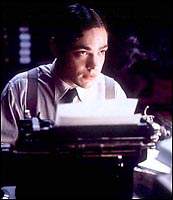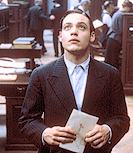FILM NOTES
FILM NOTES INDEX
NYS WRITERS INSTITUTE
HOME PAGE


(KARAKTER)
(Netherlands, 1998, 124 minutes, color, 35mm)
In Dutch with English subtitles
Directed by Mike van Diem
Cast:
Fedja van Huet . . . . . . . . . . Katadreuffe
Jan Decleir . . . . . . . . . . Dreverhaven
Betty Schuurman . . . . . . . . . . Joba
Victor Low . . . . . . . . . . De Gankelaar
Hans Kesting . . . . . . . . . . Jan Maa
The
following film notes were prepared for the New York State Writers
Institute by Kevin Jack Hagopian, Senior Lecturer in Media Studies
at Pennsylvania State University:

CHARACTER learned its lessons from the classic films noirs. Rotterdam is allegorical, its streets and alleys a pointless, confusing landscape, a trap for the lawyer who seeks both physical and psychic escape from his grim, painful past and his uncertain future. It is his own NAKED CITY, a CITY THAT NEVER SLEEPS. Like Robert Siodmak's THE KILLERS, CHARACTER is presented through noir's favored storytelling device, the flashback, to impress on us the intransigence of Katadreuffe's destiny, the inevitability of his fate. The awful Dreverhaven is the looming presence of evil in CHARACTER, a diabolical menace like that of Orson Welles' THE STRANGER, whose shadow darkens everything and taints everyone around him with moral corruption. And like Fritz Lang's M, CHARACTER grills its suspect tirelessly, and creates surprising sympathy for a man accused of a heinous crime. As in noirs like Jacques Tourneur's OUT OF THE PAST and Phil Karlson's THE BROTHERS RICO, evil, once rooted, proves a tenacious organism, and stubbornly continues to bear its sour fruit. CHARACTER is filled with the gargoyles and human detritus a noir city requires; Katadreuffe's confidante, for instance, is a philosophical, strange-looking fellow perfectly at home in this menagerie. Rogier Stoffers' cinematography wanders malevolently through back-alley Rotterdam the way Welles' camera roams Venice, California in TOUCH OF EVIL. CHARACTER seems to have drunk deep at noir's poisoned spring.
But CHARACTER's inspiration comes from more than van Diem's hours in the movie theater. The film is based on Ferdinand Bordevik's 1938 novel, Character. Mixing a Dickensian eye for social detail with Dostoyevsky's sadism and fascination with the texture of corruption, Bordevik may have also borrowed from Kafka. Bordevik's vision of Rotterdam is, like Kafka's Prague, a setting for a sardonic interior game of chutes and ladders Katadreuffe discovers he cannot win.
What finally concerns Mike van Diem, however, is not the weaving of a subtle fabric of homages to cinematic and novelistic forebears. It is nothing less than the conversion of 1920's Rotterdam, and the sad story of the young lawyer, into a parable for a world weary of a century of epic criminality, mass destruction, and vast pathological hatreds. It is required of Katadreuffe that he churn up his past, with all its ghosts and monsters, to guarantee some minuscule hope of salvation. Only with such archaeology, says van Diem, can we hope to move from a very solitary confinement to glimpse redemption. The determination to confront the past requires that ineffable quality for which his film is named.
— Kevin Hagopian, Penn State University
For additional information, contact the Writers Institute at 518-442-5620 or online at https://www.albany.edu/writers-inst.